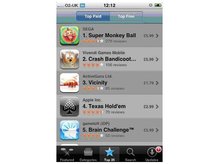App store shootout: Apple vs BlackBerry vs Nokia vs Android
Which is the best?

Mobile applications aren't just for smartphone-waving wannabe business gurus – they can just as easily be for fun, flirting and football as well as watching share prices slide.
A lucrative new business opportunity for networks and developers alike, the surge in demand for downloadable mobile applications means one thing: whoever has the best store stands to gain the vote of the new generation of app fans.
So with stalwarts Nokia and BlackBerry up against the might of mobile upstarts like Google and Apple, we thought we'd do a bit of window-shopping to find out what's in store…
Apple App Store
Steve Jobs' initial refusal to give any ground to networks with the iPhone has left the App Store with a seemingly unassailable lead in the market. With no network involvement and only a single handset to cater for, third-party apps can flourish – and do.
Unlike the stores of Nokia and BlackBerry, both the iPhone and the App Store have been built from the ground up as totally new concepts. The result? An interface that engenders a feeling of being 'at one' – simple, intuitive and unmistakably Apple.
The App Store is burgeoning with thousands of applications covering every possible use, from Tube updates to 'Pull My Finger' (we'll let you guess what that one does…). Browsing is a joy, and each app comes with a comprehensive description and numerous user ratings and comments to help decision-making. There's also usually a screengrab of each app to give you a better idea about how it works before downloading. Complaints tend to centre around apps causing crashes and updates wiping data, but you run that particular gauntlet with most third-party apps.
Get daily insight, inspiration and deals in your inbox
Sign up for breaking news, reviews, opinion, top tech deals, and more.
Shortcuts to Featured Apps, Categories, Top 25, Search and Updates are located in a bar at the bottom of the screen – the latter letting you know as soon as a new version of an installed app becomes available. Categories are too extensive to list here (there's 20), suffice to say they're comprehensive. The Search function is therefore invaluable, acting like the Spotlight feature on OS X Macs.
Before the App Store, few people knew it was even possible to get applications for their phone outside those supplied with the handset. Now it's one of the main drivers in the market. Some feat for a mobile newbie.
Google Android Market
The Android Market had just over 50 apps on launch – considerably smaller than the 500-plus Apple had ready to tempt punters at the outset of its App Store. But with the free-loving world of the open-source community and the lack of restrictions placed on developers, it won't be long before the shelves of the Android Market are overflowing with innovative apps.
Like all things Google-related the Android Market is clean and simple to navigate, right from the moment you tap that shopping-bag icon. The main menu consists of a bar with featured apps, followed by a list of the main categories underneath: Applications, Games, Search and My Downloads. Each category has a range of sub-categories to make it easier to locate the type of app you're after.
Currently all apps in the Android Market are freebies, which is likely to continue until the finer points of payment agreements have been ironed out. That doesn't mean there's any lack of quality, though, with plenty of genuinely handy apps available like iSkoot for Skype access, MySpace Mobile and the ShopSavvy barcode scanner price comparison app.
Downloading is simple, and once you've installed you're free to rate the app from one to five and add a comment for the benefit of potential users. It may not revolutionise the face of mobile apps overnight, but the Android Market is certainly one to get excited about for the future.